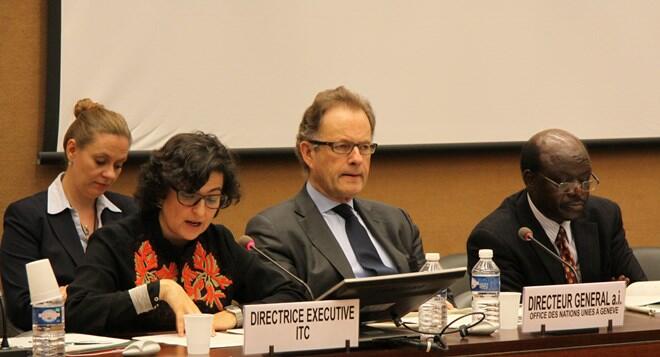
Renforcer les services des PME dans le commerce des marchandises (en)
Helping exporters of commodities to develop sustainable businesses in global value chains is an expertise of the International Trade Centre (ITC), according to its Executive Director Arancha González. She said the ITC has assisted farmers in the cotton and coffee industries in adding value to their products sold through small and medium-sized enterprises (SMEs). She was speaking at the opening of the 5th Global Commodities Forum on 7 April 2014 held at the United Nations Conference on Trade and Development (UNCTAD) headquarters in Geneva. The theme was ‘Global value chains, transparency and commodity-based development’.
‘Commodities are incredibly important to our shared mission of making trade work for development,’ said Ms González. ‘Cotton and coffee, two commodities ITC has worked on extensively show the enormous part commodities can play. ITC works with SMEs to add value to commodities through improved services, by increasing transparency and reducing transaction costs for private voluntary standards, and improving how developing countries connect to global value chains through multi-stakeholder strategies.’
The Executive Director said ITC’s work on commodities focuses heavily on increasing returns to SMEs including small holders, increasing value-added production, and achieving development impact through knowledge transfer, skills upgrade and transfer of technology. In the case of cotton, Ms González said ITC works with producers and exporters on adding value to cotton by expanding activities to provide services such as collection and transport and improving the product by reducing fibre contamination. She added that technical assistance is also provided to cotton producers on certification under a sustainability scheme such as organic or fair trade production. Ms González said the aim is to help producers move up the value chain from fibre to yarn, fabrics and garments, besides helping to promote high quality artisanal production such as handloom fabrics for high value-added textiles.
‘In the mango sector in Senegal, exporters have significantly increased their revenues through better packaging, more varieties and improved post-harvest handling,’ said Ms González. ‘In the area of spices, we are working in Zanzibar with producers to help them move away from traditional low value trading to the concept of branded cloves traded directly from Zanzibar to final consumers. In Uganda, we have worked with producers and exporters in the coffee sector leading to a more than doubling in the value of their exports of mainstream coffee by improving quality. Improving services around commodities, through packaging, quality standards and supply chain logistics are key elements in adding value and improving returns to SMEs.
Ms González stressed the importance of transparency in value chains, trading activities, product specifications and meeting private voluntary standards. She said ITC’s Standards Map, a web-based platform to promote transparency by increasing the accessibility of private standards to users to conduct research on the impacts of standards and enable SMEs to comply, is a useful tool. These private standards may require traceability of products, including as components in processed goods; as well as products generated from extractive industries. Ms González said adhering to these standards have become critical as consumers become more sensitive to social and environmental issues in the supply chain.
Private voluntary standards pose a number of challenges including complexity through multiple standards which require understanding to manage changes in criteria and overlaps between standards. The lack of capacity and technical knowledge poses as a challenge in compliance, and the high costs of implementation has to be borne by the producer. She said increased transparency, inter-operability and fostering convergence through institutional capacity-building for compliance are critical for producers to meet voluntary sustainability standards.
‘Helping SMEs to benefit from commodity-centred value chains requires multi-stakeholder platforms for dialogue and for policy coherence. This often extends beyond national to regional value chain governance. There are ample opportunities for developing countries to thrive in commodity-centred value chains. We must ensure that the necessary assistance, accompanying measures and governance mechanisms are in place,’ said Ms González.
Lending support to the issue of good governance in promoting commodity-based development, the Secretary-General of the United Nations Conference on Trade and Development (UNCTAD), Dr Mukhisa Kituyi, said transparency in global value chains can lead to improved governance of resource wealth. For the commodities sector, this can translate into development benefits.
‘Global value chains represent an opportunity for developing countries to diversity their economies, build new capabilities and reach new markets,’ said Dr Kituyi. ‘But the informal governance of these value chains is weak on questions of equity and negative externalities. This weak governance can lead to “capture” by a small number of powerful firms and can allow pollution, workplace health and safety concerns, as well as food price volatility to undermine the net social benefit of value chain participation. The challenge is to identify governance practices that permit value chain participation but ensure an equitable distribution of benefits while minimizing costs.’
The Secretary-General warned that commodity-dependent developing countries are over-reliant on raw material exports which leads to difficulties in the upgrading and diversifying of their economies.
‘Today we continue to warn about the risk of commodity extraction projects becoming enclaves – oriented towards export markets, isolated from the domestic economy, and disassociated from the outcomes for the country’s citizens. As many developing countries have experienced, foreign and domestic political interests take root around the rents that flow from extractive projects. This can drain value away from public coffers through corruption and other abuses. This drain on rents impedes efforts to diversify towards higher value-added activities,’ said Dr Kituyi.
He stated that commodities and natural resource wealth, governed responsibly, can underwrite durable improvements in the quality of life of citizens.



